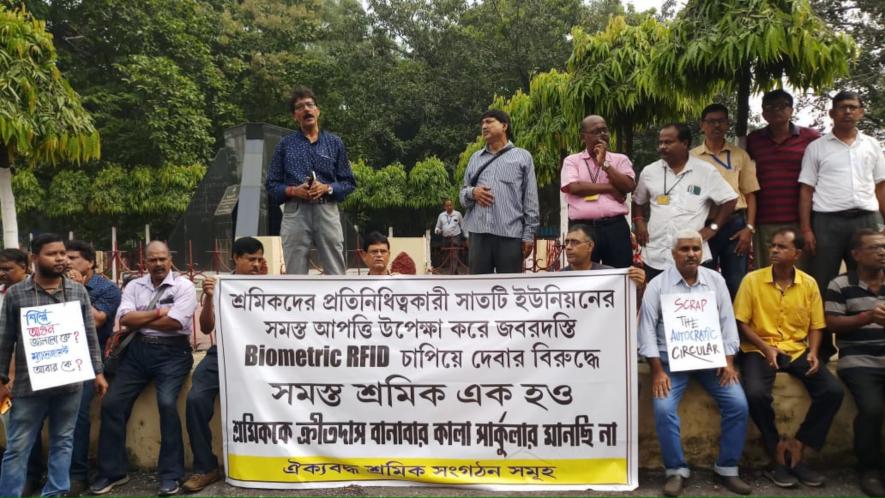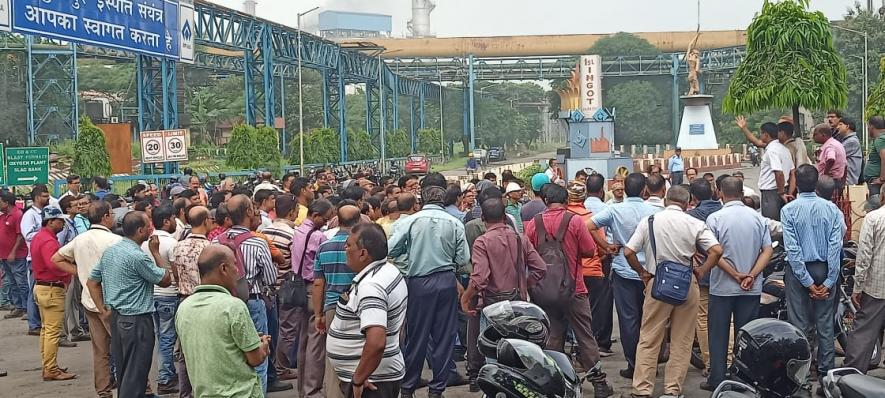Labour Discontent in Durgapur Steel Plant Over Biometric Attendance and RFID Tags

Protests in DsP premises over biometric attendance and usage of RFID tags
Kolkata: Stringent protests have erupted at the Durgapur Steel Plant (DSP) over the forced implementation of biometric attendance and the issuance of Radio Frequency Identification (RFID) tags to employees. The Centre of Indian Trade Union (CITU)-affiliated Hindustan Steel Employees Union (HSEU) initially initiated the movement, citing concerns about compromising employees' individual freedom. Now, all seven major trade unions of the steel plant have joined the movement. After jointly submitting memorandums to the DSP authorities, the unions are organising gate meetings, in-plant gatherings, and larger protests and demonstrations outside.
DSP has been consistently profitable for the past decade, showcasing remarkable performance and productivity, making it one of the top-performing units of the Steel Authority of India (SAIL). SAIL, the key player in the public sector steel industry, has achieved substantial profits and holds the prestigious Maharatna status among the Navaratna companies in the country. In the last year, SAIL reported an annual profit of Rs 12,015 crore.
However, DSP faces several challenges, including the urgent need to expand its annual production capacity from 2.2 million tonnes to 4 million tonnes to transform into an integrated steel plant. Additionally, it grapples with a bottleneck in finished product output, with only 24% compared to other SAIL plants boasting 85% to 100% finished products.
HSEU argues that while the immediate need is to expedite the steel plant's expansion, the management appears to be intentionally fostering discontent to obstruct the modernisation project. It's worth noting that the modernisation project, originally planned for the company-acquired land, has encountered delays due to land occupation by encroachers demanding resettlement packages. DSP management's unilateral attempt to remove the encroachers resulted in resistance, hampering the acquisition of 1,200 to 1,500 acres of land necessary for the modernisation project.
NewsClick interviewed Biswaroop Banerjee, who highlighted that during the previous round of modernisation, SAIL invested Rs 72,000 crore. In comparison, Durgapur received only 2,800 crores for setting up a one million-tonne mill, leaving Durgapur in a disadvantaged position. Moreover, the lack of finished products adversely affects DSP's market value.
Durgapur takes pride in its conscientious employees and the highest payment for contract workers. SAIL has announced plans to enhance plant capacity from 21 million to 51 million tonnes. According to the National Steel Policy 2023, the government aims to increase steel production from 100 to 300 million tonnes over the next ten years. Consequently, DSP must address its bottlenecks and augment production.

Banerjee questioned the necessity of introducing biometric attendance and RFID-embedded cards when employees already carry normal identity cards and vehicle passes for access within the DSP premises. He further argued that biometric attendance can be tampered with, compromising employee data and leading to identity theft. The use of RFID tags around wildlife's necks to track their movement does not justify treating employees like wild beasts. Additionally, the RFID system would constantly surveil employees, which is unacceptable.
Debasish Paul, an employee at DSP, emphasised that under the IT Act, consent should be sought to collect biometric data and use RFID cards on employees. He revealed that only 1% of the 6,744 steel plant employees have consented to use their biometric data and RFID cards, with 99% vehemently opposing the risk of identity theft. Paul also noted that the company had not fulfilled its obligations to contract workers and employees while embarking on a 440-crore project, which he regarded as a wasteful allocation of resources.
Get the latest reports & analysis with people's perspective on Protests, movements & deep analytical videos, discussions of the current affairs in your Telegram app. Subscribe to NewsClick's Telegram channel & get Real-Time updates on stories, as they get published on our website.
























